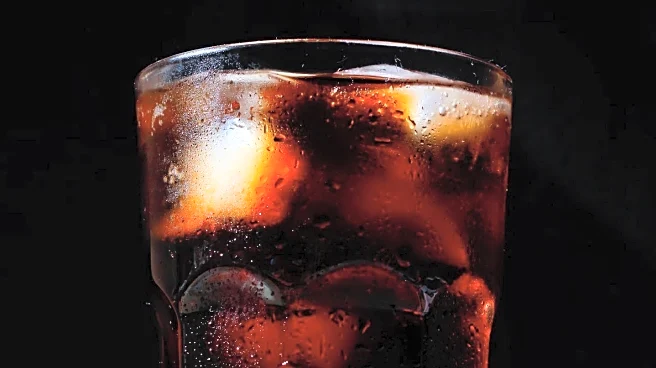What is the story about?
What's Happening?
A recent study has identified a significant link between the consumption of both sugar-sweetened and low or non-sugar-sweetened beverages and an increased risk of metabolic dysfunction-associated steatotic liver disease (MASLD). The research, presented at UEG Week 2025, analyzed data from over 103,000 participants from the UK Biobank, revealing that consuming more than one can of soda daily is associated with a higher risk of developing MASLD. The study found that sugar-sweetened beverages were linked to a 50% greater risk, while low or non-sugar-sweetened beverages were associated with a 60% greater risk. Additionally, low or non-sugar-sweetened beverages were connected to an increased risk of liver-related mortality. The findings challenge the perception that diet sodas are a healthier alternative to regular sodas.
Why It's Important?
The study's findings have significant implications for public health, particularly concerning dietary choices and liver health. With MASLD being a precursor to more severe liver conditions and cardiovascular diseases, understanding the impact of beverage consumption is crucial. The research suggests that both sugary and artificially sweetened drinks may pose risks to liver health, urging a reevaluation of what constitutes a 'healthy' beverage. This could influence dietary guidelines and consumer behavior, potentially leading to a shift towards healthier alternatives like water. The study also highlights the need for further research into the biological mechanisms linking these beverages to liver disease, which could inform future public health policies and recommendations.
What's Next?
The next steps involve submitting the full study for peer review and publication, allowing the scientific community to scrutinize and build upon the findings. Researchers aim to explore the biological mechanisms linking artificially sweetened beverages to liver disease and investigate whether different types of sweeteners carry varying risks. Long-term studies in more diverse populations are necessary to strengthen the evidence base. Clinically, the findings suggest guiding individuals towards healthier beverage choices, emphasizing water as the safest option. This could lead to changes in dietary recommendations and increased public awareness about the potential risks associated with soda consumption.
Beyond the Headlines
The study raises ethical considerations regarding the marketing of diet sodas as healthier alternatives. It challenges the common belief that these drinks are risk-free, highlighting the need for transparency in food and beverage labeling. The findings could prompt discussions about regulatory measures to ensure consumers are informed about the potential health risks associated with artificially sweetened beverages. Additionally, the study underscores the importance of considering the long-term health impacts of dietary choices, which could influence cultural attitudes towards consumption and health.
















